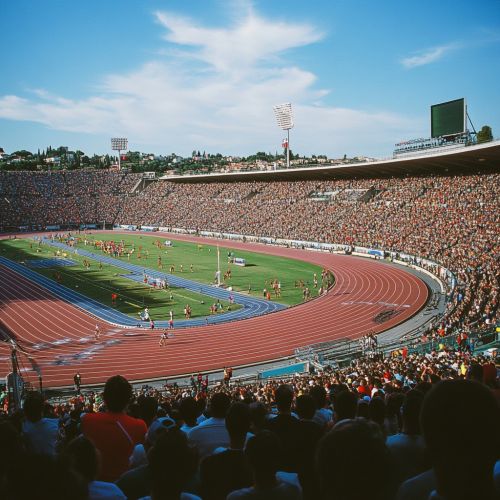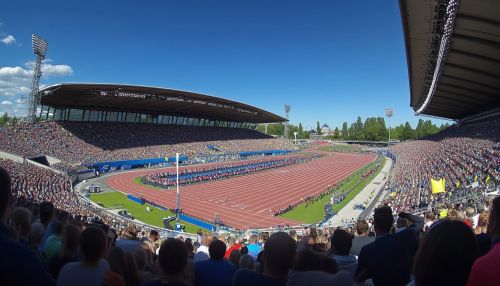World Championships in Athletics
World Championships in Athletics
The World Championships in Athletics, also known as the World Athletics Championships, is a biennial athletics competition organized by World Athletics (formerly known as the International Association of Athletics Federations, or IAAF). It is one of the most prestigious events in the sport of athletics, featuring a wide range of track and field events. The competition brings together athletes from around the globe to compete at the highest level.
History
The inaugural World Championships in Athletics was held in Helsinki, Finland, in 1983. Prior to this, the Olympic Games were the primary international competition for track and field athletes. The establishment of the World Championships provided an additional platform for athletes to showcase their talents and compete for world titles.
The decision to create the World Championships was made in response to the growing popularity of athletics and the desire to have a standalone event dedicated solely to the sport. The championships have since grown in size and stature, becoming a key event on the international athletics calendar.
Competition Structure
The World Championships in Athletics feature a wide range of events, divided into track events, field events, and combined events. The competition typically spans over nine days, with events scheduled throughout each day. The following sections provide an overview of the different types of events included in the championships.
Track Events
Track events at the World Championships include sprints, middle-distance, and long-distance races, as well as hurdles and relay races. Key events in this category include:
- 100 meters
- 200 meters
- 400 meters
- 800 meters
- 1500 meters
- 5000 meters
- 10,000 meters
- 110 meters hurdles (men)
- 100 meters hurdles (women)
- 400 meters hurdles
- 4x100 meters relay
- 4x400 meters relay
These events test athletes' speed, endurance, and tactical abilities. The sprint events are typically the most high-profile, attracting significant attention from spectators and media.
Field Events
Field events at the World Championships include jumping and throwing disciplines. Key events in this category include:
- Long jump
- Triple jump
- High jump
- Pole vault
- Shot put
- Discus throw
- Hammer throw
- Javelin throw
Field events require a combination of strength, technique, and precision. Athletes compete to achieve the greatest distance or height in their respective disciplines.
Combined Events
The World Championships also feature combined events, which test athletes' versatility and endurance across multiple disciplines. The main combined events are:
- Decathlon (men)
- Heptathlon (women)
The decathlon consists of ten events: 100 meters, long jump, shot put, high jump, 400 meters, 110 meters hurdles, discus throw, pole vault, javelin throw, and 1500 meters. The heptathlon consists of seven events: 100 meters hurdles, high jump, shot put, 200 meters, long jump, javelin throw, and 800 meters.
Notable Performances and Records
The World Championships in Athletics have seen numerous memorable performances and record-breaking achievements. Some of the most notable records include:
- Usain Bolt's 9.58 seconds in the men's 100 meters at the 2009 World Championships in Berlin.
- Florence Griffith-Joyner's 21.34 seconds in the women's 200 meters at the 1988 Seoul Olympics, which remains the world record.
- Mike Powell's 8.95 meters in the men's long jump at the 1991 World Championships in Tokyo, which remains the world record.
These performances have cemented the athletes' legacies and contributed to the rich history of the championships.


Host Cities and Venues
The World Championships in Athletics have been hosted by various cities around the world. Some of the notable host cities include:
- Helsinki, Finland (1983, 2005)
- Rome, Italy (1987)
- Tokyo, Japan (1991)
- Stuttgart, Germany (1993)
- Gothenburg, Sweden (1995)
- Athens, Greece (1997)
- Seville, Spain (1999)
- Edmonton, Canada (2001)
- Paris, France (2003)
- Berlin, Germany (2009)
- Moscow, Russia (2013)
- Beijing, China (2015)
- London, United Kingdom (2017)
- Doha, Qatar (2019)
The selection of host cities is based on a bidding process, with cities presenting their proposals to World Athletics. The chosen cities are required to provide suitable venues and infrastructure to accommodate the athletes, officials, and spectators.
Qualification and Participation
Athletes qualify for the World Championships in Athletics through a combination of automatic qualification standards, national trials, and invitations. World Athletics sets qualification standards for each event, which athletes must meet during the qualification period. National athletics federations also hold trials to select their representatives for the championships.
Participation in the World Championships is open to athletes from all member federations of World Athletics. Each country is allowed to enter a maximum of three athletes per event, provided they have met the qualification standards. In some cases, additional athletes may be invited to ensure a full field of competitors.
Impact and Legacy
The World Championships in Athletics have had a significant impact on the sport, providing a platform for athletes to achieve international recognition and success. The championships have also contributed to the development of athletics by promoting the sport and inspiring future generations of athletes.
The legacy of the World Championships can be seen in the numerous records and memorable performances that have taken place over the years. The event has also played a role in advancing the standards of competition and fostering a spirit of sportsmanship and camaraderie among athletes from different countries.
Challenges and Controversies
Like any major sporting event, the World Championships in Athletics have faced challenges and controversies over the years. Some of the key issues include:
- Doping: The use of performance-enhancing drugs has been a persistent issue in athletics. World Athletics has implemented strict anti-doping measures to combat this problem, including rigorous testing and sanctions for athletes found guilty of doping.
- Governance: The governance of World Athletics has come under scrutiny at times, with concerns about transparency and decision-making processes. Efforts have been made to address these issues and improve the organization's governance.
- Political and Social Issues: The selection of host cities and the participation of athletes from certain countries have occasionally been influenced by political and social factors. World Athletics strives to maintain a neutral stance and ensure that the championships are conducted fairly and inclusively.
Future of the World Championships
The future of the World Championships in Athletics looks promising, with continued growth and development expected in the coming years. World Athletics is committed to enhancing the championships and ensuring that they remain a premier event in the sport.
Efforts are being made to increase the global reach of the championships, with a focus on promoting athletics in regions where the sport is less developed. Innovations in technology and broadcasting are also being explored to enhance the spectator experience and engage a wider audience.
